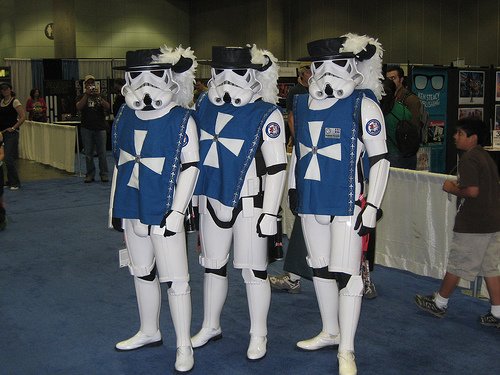The Star Wars Celebration IV convention is in full swing, and here in Los Angeles tens of thousands of fans are having a group geekout as the film hits its 30th anniversary today. I got to talk with the actor who plans Jango Fett and all the Clone Troopers and impress him with my knowledge of the New Zealand national anthem (I lived there for a year as a kid), got to thank Admiral Piett for being such a great villain, and gave free Pocky to the black chick who plays the green chick that Jabba the Hut dumps into the Rancor pit. Best of all, a Japanese VIP was having trouble communicating with Anthony Daniels (C-3P0) and I got to come to her rescue — that was cool. As usual, it’s great to be in a place where we can meet and greet our wonderful customers, and if you have plans to be at the show, which runs through Monday, please visit us in booth 924 and say hi! (See this page for info on the show.)
I talked last time about Japanese being related to Basque, Turkish, and Hungarian. This was a joke, although it does share certain linguistic features with these languages (also Finnish and some Native American tongues), mainly in that it’s an “agglutinating” language, which just means it puts a lot of information in the verb conjugation rather than with helping verbs. Some information that can be contained in the verb form include passive voice, causality, negatives, if constructions and so on, and a single conjugated verb could, if you need it to, communicate something like “if I hadn’t been made to work, (I wouldn’t have missed my favorite TV show)…” While most languages are grouped into families, the most massive being the Indo-European that spans India and Europe, Japanese is possibly in a class by itself, having no generally accepted link to another language (other than Okinawan). Various theories are discussed, including that Japanese is related to Korean based on grammatical similarities between the two languages (this is usually denied by both Japanese and Koreans, to general amusement); that Japanese is related to a theoretical language group called Altaic that directly links, say, Hungarian and Japanese through a distant linguistic ancestor; and so on. Or maybe the Japanese do descend from the Sun Goddess after all, as their myths suggest?
Psychology is a complex subject, and no matter what culture you’re from, there are certain emotional buttons that, say, TV advertisers can use to change the way you feel about their product. One button used in Japan is that of the “worried child” when mothers or fathers are made to buy some product because of the concern their daughter is showing over their health — parents are saps for kids who are worried about them. The Japanese aren’t long on nationalism, perhaps understandable given their past, but during the 1990s a health drink (Regain) gained popularity positioning itself as helping Japanese businessmen do business all over the world, with a theme song to match. One of the most pathetic commercial messages I’ve seen here is “if you use this product, foreigners will respect you.” This was the message Cabin cigarettes sent in a commercial I saw soon after arriving in Japan, shown in movie theaters (yes, they had tobacco commercials, and yes, they showed commercials before a movie started in a theatre, although both are very rare now) which featured a Japanese man riding a train in Europe. As he smoked the company’s product, the Europeans were listening attentively as he spoke, hanging on his every witty comment.
















